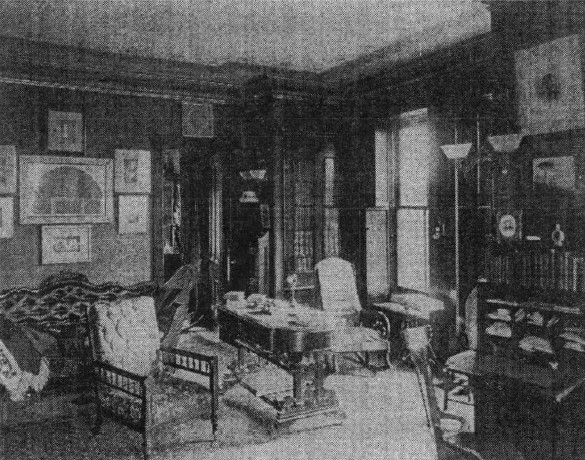
In 1873, only two years after the fire, Annie’s friend Kate Doggett, who was a militant suffragist nationally and internationally, decided to create a club that would meet every other week, dubbed the Fortnightly Club, for a select group of women who hungered for education. It apparently was a big deal to be one of the 12 charter members (there were noses out of joint about not being a charter member) but Annie was one of them, along with several more of her life-long friends. The club basically served for the college education that this generation had been denied. Members researched a topic and presented a paper to the others. Some of them were topics of the day like education or urban life. At a time when it was seen as too manly for women to study Classical Literature, Annie’s papers had topics like "Historians and Biographers: Livy, Sallust, Tacitus, Nepos, Suetonius" and "The Greek Commanders in the Persian Wars."
A number of women invited to join the Fortnightly Club had to turn down the invitation because their husbands did not allow them to leave their proper sphere in the home. Charles of course supported Annie. She found the club so invigorating that in 1875 she founded a separate Fortnightly Club in Kenwood, which met the rest of her life. In 1876, a new club formed—the Chicago Woman’s Club. Though somewhat similar in that papers were read and speakers spoke--, the club quickly developed committees and devoted itself to addressing the problems of the ever-expanding city: juvenile justice, educational reform, women’s vote, domestic violence.
The Chicago Woman’s Club was the powerhouse behind the Chicago settlement houses, which provided a wide range of social services. Annie adopted the Helen Heath Settlement House on 531 West 33rd Place, probably because her lifelong friend Marion Perkins was involved. I tried to find information on the Helen Heath Settlement House specifically, but it was in the shadow of the larger ones. The Helen Heath Settlement House was a project of Jenkins Lloyd Jones, minister of the All Soul's Unitarian Church, who did say he was using Hull House as inspiration for his far less destitute part of town. Part of the offerings would be gymnasiums, classes, workingmen’s clubs, industrial arts, women’s “domestic arts,” and support groups. One of the things I did notice is that the services that were noted in the newspapers were a day care for young children of working mothers, a club—not unlike the Fortnightly—that could also act as a support group, and musical performances. The paper noted the children’s appearance in the choir ranged from rags to well-dressed, but their voices blended into beautiful music. I have the feeling that Annie believed that people on hard times needed to feed their souls and lift their horizons. Annie eventually endowed a traveling fellowship in Greek.
A lot of Annie’s appearances in the paper involve fund raising for the settlement house by hosting performances of Shakespeare’s Twelfth Night on her lawn and balls at the Chicago Beach Hotel. She supported the Helen Heath Settlement the rest of her life.
With the fire, people had moved south from the city and the population of Hyde Park township boomed, particularly in the more working class areas of Hyde Park around 53rd. Annie worried that people without means did not have access to books, so she rented a storefront on 53rd near Lake Park, in the center of Hyde Park, and created the Hyde Park Lyceum—a lending library of books and a place for free lectures. Annie was president but she recruited her friends to donate cash and books and argued that having books conveniently available, particularly for the young, was a critical service. In other words, she argued for the need for a branch library in Hyde Park. One of her friends was Mrs. Blackstone—and so it was through Annie that the idea of the Blackstone Branch Library was born, the first branch library in Chicago.
In the midst of this activity, tragedy struck. Charles became terribly ill from a failing heart for a number of years, developing agonizing edema. He died in 1881, to an out-pouring of grief from his community. In 1883, Annie lost her mother. Most of her siblings were gone. She alone survived.
No comments:
Post a Comment